Tag Archives: executed minors
Saudi Arabia – beheading in the 21st century
 Last month Saudi Arabia in violation to its international obligations publically executed a child (Dhahian Rakan al-Sibai’i ) by beheading for a murder that he allegedly committed at the age of 15.
Last month Saudi Arabia in violation to its international obligations publically executed a child (Dhahian Rakan al-Sibai’i ) by beheading for a murder that he allegedly committed at the age of 15.
Sadly, not only were there not much official international government objections to this inhumane and illegal execution, but shortly after the execution the US adminstration asked the US Congress to approve an arms-sale package to Saudi Arabia and five other Persian Gulf countries that may total more than $20 billion, which happens to be the largest arms deal negotiated by the Bush administration. Last week also US Secretary of State Condoleezza Rice with Defense Secretary Robert Gates met with King Abdullah and other Saudi officials in the Red Sea port of Jeddah.
There are currently at least two other child offenders facing execution in Saudi Arabia. Saudi Arabia has a systematic history of human rights and children’s right violations. Following is a history of beheading practice in Saudi Arabia:
Saudi Arabia – beheading in the 21st century. 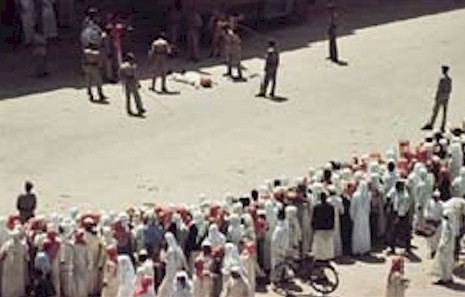
Saudi Arabia uses public beheading as the punishment for murder, rape, drug trafficking, sodomy, armed robbery, apostasy and certain other offences. Forty five men and 2 women were beheaded in 2002, a further 52 men and 1 woman in 2003 and 35 men and a woman in 2004. Executions rose in 2005 with 88 men and 2 women being beheaded and then reduced to 35 men and four women in 2006.
The condemned of both sexes are given tranquillisers and then taken by police van to a public square or a car park after midday prayers. Their eyes are covered and they are blindfolded. The police clear the square of traffic and a sheet of blue plastic sheet about 16 feet square is laid out on the ground.
Dressed in their own clothes, barefoot, with shackled feet and hands cuffed behind their back, the prisoner is led by a police officer to the centre of the sheet where they are made to kneel facing Mecca . An Interior Ministry official reads out the prisoner’s name and crime to the crowd.
Saudi Arabia uses a traditional Arab scimitar which is 1000-1100 mm long. The executioner is handed the sword by a policeman and raises the gleaming scimitar, often swinging it two or three times in the air to warm up his arm muscles, before approaching the prisoner from behind and jabbing him in the back with the tip of the blade, causing the person to raise their head. Then with a single swing of the sword the prisoner is decapitated.
Normally it takes just one swing of the sword to sever the head, often sending it flying some two or three feet. Paramedics bring the head to a doctor, who uses a gloved hand to stop the fountain of blood spurting from the neck. The doctor sews the head back on, and the body is wrapped in the blue plastic sheet and taken away in an ambulance. Burial takes place in an unmarked grave in the prison cemetery.
Beheadings of women did not start until the early 1990’s, previously they were shot. Forty women have been publicly beheaded up to the end of 2006. Most executions take place in the three major cities of Riyadh , Jeddah and Dahran. Saudi executioners take great pride in their work and the post tends to be handed down from one generation to the next.
Saudi Arabia Beheads a child

AMNESTY INTERNATIONAL
Public Statement
AI Index: MDE 23/031/2007 (Public)
News Service No: 149
3 August 2007
Amnesty International is outraged at the recent beheading of a child offender in Saudi Arabia. According to press reports, the execution took place in the city of Taif on 21 July 2007.
Dhahian Rakan al-Sibai’i was sentenced to death for a murder he allegedly committed when he was just 15 years old. He was held in a juvenile facility until his 18th birthday and then moved to an adult prison. Dhahian appealed to the families of the victim to pardon him — as allowed by Shari’a law — but the outcome of his appeal is not known.
In May 2007, Amnesty International issued urgent appeals to the government of Saudi Arabia calling for a halt to his execution and urging commutation of the death sentence against him
The organisation calls upon King Abdullah to immediately halt all pending executions and take all necessary steps to stop the imposition of death sentences on juvenile offenders.
Due to the strict secrecy of the criminal justice system, it is not possible to know how many juvenile offenders have been put to death in Saudi Arabia, but according to a media report, over 100 juvenile offenders are said to be on death row. They include Rizana Nafeek, a Sri Lankan national who was 17 at the time of the alleged murder for which she was sentenced to death following her arrest in 2005. They may also include Sultan Kohail, a 16-year-old Canadian national who was tried early this year on murder charges along with his brother Mohamed Kohail, aged 22.
Dhahian Rakan al-Sibai’i’s beheading is one of the latest in a recent spate of executions in Saudi Arabia. Since September 2006, at least 143 men and women have been executed in the Kingdom, which is one of the highest execution rates in the world.
Trial proceedings usually take place behind closed doors without adequate legal representation, and invariably fall short of international fair trial standards. Both children and adults are often convicted on the basis of “confessions” obtained under duress, including torture or other ill-treatment during incommunicado detention.
Background
International law prohibits Saudi Arabia from executing people for crimes committed when they are below the age of 18. Saudi Arabian officials have maintained that they comply with this obligation, contained in the Convention on the Rights of the Child, because they do not execute children. In fact, the convention prohibits executions for crimes committed while a person is a child, regardless of when the sentence is carried out.
IGLHRC speaks out on second anniversary of execution of two Iranian teenagers
The International Gay and Lesbian Human Rights Commission (IGLHRC) on the second anniversary of the execution of two Iranian children who were executed issued an statement:
 NEW YORK, July 18, 2007 - “Despite a widely publicized outcry two years ago when Iranian authorities executed two young men in the northeastern city of Mashhed, the government continues to target, arrest, prosecute, and execute individuals under its sodomy law.
NEW YORK, July 18, 2007 - “Despite a widely publicized outcry two years ago when Iranian authorities executed two young men in the northeastern city of Mashhed, the government continues to target, arrest, prosecute, and execute individuals under its sodomy law.
The International Gay and Lesbian Human Rights Commission (IGLHRC) condemns Iran’s violations of human rights law and asks that human rights groups around the world work to support those targeted by the government.
Two years ago, on July 19, 2005, two teenage boys, Mahmoud Asgari and Ayaz Marhoni, were hanged in public for their alleged involvement in sodomy and rape. Both teenagers were juveniles at the time of the offense, and one was believed to have been a juvenile at the time of his execution.
The United Nations Convention on the Rights of the Child, of which Iran is a signatory, forbids the execution of juveniles under the age of 18 or those who were under 18 at the time of the alleged crime ”
To read the full statement visit : http://www.ukgaynews.org.uk/Archive/07/July/1803.htm
To read more about the two executed teenagers Mahmoud Asgari and Ayaz Marhoni visit: https://www.stopchildexecutions.com/minors_executed.aspx
Iran Leads the World in Executing Children
New Executions Highlight Arbitrary Nature of Iranian Justice
![]() Iran holds the deplorable distinction of leading the world in juvenile executions, and the authorities should end this practice at once.
Iran holds the deplorable distinction of leading the world in juvenile executions, and the authorities should end this practice at once. ![]()

Iran’s highest judicial authorities have repeatedly upheld death sentences handed down to juvenile offenders charged with committing crimes when they were as young as 15. Such sentences violate Iran’s international treaty obligations, which prohibit the death penalty for crimes committed by people under 18. In some cases, the death sentences also violate Iranian domestic law requiring that children under 18 be tried before special juvenile courts.
“Iran holds the deplorable distinction of leading the world in juvenile executions, and the authorities should end this practice at once,” said Clarisa Bencomo, children’s rights researcher on the Middle East at Human Rights Watch. “The Iranian government needs to stop sending children to the gallows and start living up to its international obligations by issuing clear legislation to ban the juvenile death penalty.”
Iran is known to have executed two juvenile offenders already this year. Syed Mohammad Reza Mousavi Shirazi, 20, was executed in Adel Abd prison in the city of Shiraz on April 22 for a murder he allegedly committed when he was 16. His family was not notified of the planned execution and did not see him prior to the execution.
Documents in Human Rights Watch’s possession show that both the lower court and the Supreme Court acknowledged that Mousavi was wrongly tried in an adult court. Nevertheless, the Supreme Court rejected Mousavi’s request for a retrial before a juvenile court, accepting the lower court’s argument that it was in effect “acting in place of a juvenile court.” The Supreme Court confirmed the death sentence, stating “in the light of the direct confession of the accused and the rest of the evidence presented against him, the court sees no significant flaws or shortcomings in the proceedings.” Torture and ill-treatment are common in Iranian detention centers, making the court’s willingness to accept a child’s confession in a death penalty case particularly disturbing.
In a separate case, Iranian authorities executed 17-year-old Sa’id Qanbar Zahi in Zahedan on May 27. According to press accounts, Zahi’s arrest, confession, trial, sentencing, and execution took place in the space of a few weeks. If true, these factors raise serious doubts that the 17-year-old was able to mount a meaningful defense, and raise further serious concerns about whether other basic fair trial standards were met.
Iranian officials have repeatedly stated that they are working to comply with Iran’s legal obligations by ending executions of child offenders. High-ranking Judiciary officials have repeatedly said that no juvenile executions take place in Iran. On October 1, the chief of Tehran’s Judiciary, Alireza Avaii, told reporters that “our current policy is that execution sentences for juveniles not be implemented and it has been a long time that any such executions have taken place.”
Iranian officials also point to legislation that would establish a new legal framework for juvenile courts, pending in parliament since July 2006, and claim that it would end executions of juvenile offenders. In fact, this legislation would only offer the possibility of reducing sentences if the judge finds that the defendant is not mentally mature. The proposed legislation (Article 33) makes clear that reduction of sentences in qisas and hadd crimes, for which punishment includes execution, shall be applied “when the complete mental maturity of the defendant is in doubt.” Qisas crimes are offenses against a private right where the victim is entitled to a similar retribution, and hadd crimes are offenses with punishments specified under the Islamic penal code.
Article 31.3 of the proposed law would allow a sentence of the death penalty or life imprisonment, if imposed on juvenile defendants ages 15 to 18, to be reduced to a term of imprisonment ranging from two to eight years in a juvenile correctional facility. The majority of juvenile executions in Iran are for qisas and hadd crimes, where judges would continue to have discretion to order executions, if the mental maturity of the defendant is determined by the judge not to be in doubt.
“Iran has had more than enough time to demonstrate its commitment to ending the juvenile death penalty,” Bencomo said. “The government now needs to take urgent, concrete steps to end this practice.”
Human Rights Watch called on the Iranian parliament to remove from the proposed law the discretion for a judge to impose the death sentence on a juvenile offender. Parliament should also pass the remainder of the proposed legislation mandating reduction of sentences as soon as possible. Human Rights Watch also urged the Council of Guardians, a clerical body with veto power over adopted legislation, not to oppose the proposed legislation.
Only Iran, Sudan, China and Pakistan are known to have executed juvenile offenders since 2004. Sudan carried out two such executions in 2005, while China executed one juvenile offender in 2004 and Pakistan executed one juvenile offender in 2006. In contrast, Iran is known to have executed at least three juvenile offenders in 2004, eight in 2005, and four in 2006. In total numbers, only China carries out more executions than Iran. On a per capita basis, Iran executes more people annually than any other country.
Two core international human rights treaties, the Convention on the Rights of the Child and the International Covenant on Civil and Political Rights, prohibit the imposition of the death penalty for crimes committed before the age of 18. Iran has ratified both treaties.
ایران، پیشرو در اعدام نوجوانان در دنیا
HUMAN RIGHTS WATCH REPORT ON IRAN BEING #1 IN EXECUTING CHILDREN
(FOR ENGLISH CLICK HERE: http://scenews.blog.com/1870333/ ) , (FOR ARABIC CLICK HERE: 
اعدام های جدید ماهیت خودسرانه دستگاه قضایی ایران را برجسته کرده است
سازمان دیده بان حقوق بشر امروز اعلام کرد که ایران باید فورا استفاده از مجازات مرگ برای جرائمی که نوجوانان زیر 18 سال انجام می دهند را به تعلیق در بیاورد.
تاکنون مشخص شده است که ایران از سال 2004 ، 17 بزهکار کودک را اعدام کرده است که این رقم 8 برابر بیشتر از اعدام کودکان در هر کشور دیگری است.
مقامات عالی رتبه قوه قضائیه ایران همواره احکام مرگ که به صورت پیاپی برای کودکان بزهکار صادر شده است ، را تائید کرده اند. در حالی که در برخی موارد این محکومان تنها 15 سال سن داشتند.
این احکام میثاقهای بین المللی که مجازات مرگ برای جرائم مرتکب شده از سوی افراد زیر 18 سال را منع می کند و ایران ملزم به رعایت آنها است را نقض می کند.در برخی موارد این حکم ها حتی بر خلاف قوانین داخلی ایران است که محاکمه افراد زیر 18 سال را در صلاحیت دادگاه ویژه اطفال میداند.
کلاریسا بن کامو پژوهشگر حقوق کودکان در بخش خاور میانه سازمان دیده بان حقوق بشر گفت :” ایران شاخص شرم آور مقام اولی دنیا در اعدام کودکان را حفظ کرده است و مقامات مسئول باید فورا به این وضعیت پایان دهند.”
وی افزود که “حکومت ایران نیازمند است تا فرستادن کودکان برای اعدام را متوقف کند و اجرای الزامات بین المللی را از طریق تدوین و تصویب قوانینی در این باره آغاز نماید که به شکلی صریح مجازات مرگ کودکان را ممنوع کند.”
ایران دو بزهکار جوان را در سال جاری اعدام کرده است. سید محمد رضا موسوی شیرازی 20 ساله در 2 اردیبهشت 1386 در زندان عادل آباد شیراز به جرم قتل اعدام شد.وی هنگامی که 16 سال داشت مرتکب جرم شده بود.
مقامات مسئول حتی به خانواده وی تاریخ اعدام او را اعلام نکردند. خانواده وی نتوانستند او را قبل از اعدام ببینندو آنان تنها پس از اجرای حکم از آن مطلع شدند.
مدارک موجود که در دست سازمان دیده بان حقوق بشر است ، نشان می دهد که هم دادگاه بدوی و هم دیوان عالی کشور آگاه بودند که موسوی به اشتباه در دادگاه بزرگسالان محاکمه شده است.
با این حال دیوان عالی تقاضای موسوی برای اعاده دادرسی در دادگاه ویژه اطفال را رد کرد و استدلال دادگاه بدوی را پذیرفت که این دادگاه بزرگسالان به عنوان “قائم مقام دادگاه اطفال” حکم صادر کرده است و “قید قائم مقامی سهوا از قلم افتاده است.”
این دادگاه حکم مرگ را “با عنایت به اقرار صریح متهم در کلیه مراحل دادرسی” تایید کرد.دادگاه هیچ ایراد و قصوری در روند دادرسی مشاهده نکرد در شرایطی که شکنجه و بد رفتاری در باز داشتگاه های ایران شایع است. تمایل دادگاه ها برای مبنی قرار دادن اعدام کودکان بر اساس اعترافات آنها بسیار آزار دهنده است.
در موردی دیگر ، مقامات ایرانی سعید قنبر زهی 17 ساله را در 6 خرداد 1386 در زاهدان اعدام کردند.بر اساس گزارش مطبوعات ، بازداشت،اعترافات،محاکمه، حکم و اعدام در چند هفته رخ داد. این روند باعث تردید های جدی می شود که چگونه یک نوجوان 17 ساله می توانسته است از خود دفاع موثری داشته باشد و همچنین شائبه جدی وجود دارد که آیا معیار های دادرسی عادلانه رعایت شده است؟
مقامات رسمی ایران بارها اعلام کرده اند که در حال بررسی مساله رعایت الزامات قانونی هستند تا به اعدام مجرمان نوجوان پایان دهند.
مقامات بلند پایه قوه قضائیه مکررا گفته اند که جوانان در ایران اعدام نمی شوند.رئیس دادگستری تهران علیرضا آوایی در نهم مهر 1385 به خبرنگاران گفت:” اكنون مشي بر اين است كه حكم اعدام افراد زير 18 سال اجرا نشود و مدت قابل توجهي نيز اجرا نشده است “.
مقامات ایران همچنین به تمهیدات قانونی اشاره می کنند که چهارچوب قانونی جدیدی برای دادگاه اطفال تدوین می کند که از تابستان پیش در مجلس در انتظار بررسی است و ادعا می کنند این طرح به اعدام افراد مجرم زیر 18 سال پایان خواهد داد.اما در حقیقت این قانون فقط احتمال تخفیف مجازات را پیشنهاد می کند فقط در مواردی که قاضی تشخیص دهد که متهم به لحاظ ذهنی بالغ نبوده است.ماده 33 قانون پیشنهادی به صراحت اعلام می کند که تخفیف مجازات در جرائم قصاص و حد برای مجازات هایی چون اعدام باید زمانی به کار برده شود که بلوغ روانی متهم محل شک باشد.
جرائم قصاص اقدام مجرمانه ای است علیه حقوق فردی و بر این اساس قربانی سزاوار است که کیفر مشابهی را انجام دهد. جرائم حد در قانون مجازات اسلامی تعریف شده اند.
ماده 31.3 قانون پیشنهادی بیان می کند ، حکم مجازات مرگ و حبس ابد در صورتی که برای متهمان 18-15 سال صادر شده باشد ، می تواند به احکام زندان از 2 تا 8 سال در مراکز باز پروری نوجوانان کاهش داده شود.اکثریت احکام اعدام اطفال در ایران مربوط به مجازات های قصاص و حد هستند و زمانی قابل اجرا هستند که قضات تشخیص دهند که در بلوغ روانی متهمین تردیدی وجود ندارد.
بن کامو گفت:” ایران مدت زمان زیاد و بیش از اندازه ای داشته است تا تعهد خود به پایان اعدام اطفال را نشان دهد.”
“حکومت الان باید قدم های اساسی و سریعی را در این زمینه بردارد.”
سازمان دیده بان حقوق بشر از مجلس ایران می خواهد تا صلاحیت قاضی در زمینه صدور حکم اعدام برای افراد زیر 18 سال را لغو کند. مجلس باید همچنین باقی مانده قوانین پیشنهادی برای الزامی بودن تخفیف احکام مرگ و حبس ابد را هر چه زود تر تصویب کند.
سازمان دیده بان حقوق بشر مصرا از شورای نگهبان که یک نهاد روحانی دارای حق وتو بر فراز مصوبات مجلس است ، می خواهد با این قانون پیشنهادی مخالفت نکند.
فقط ایران ، سودان ،چین و پاکستان به عنوان کشور هایی شناخته شده اند که از سال 2004 مجزمان جوان را اعدام کرده اند.
سودان دو فقره از این اعدام ها را در سال 2005 اجرا کرده است در حالی که چین یک مورد مشابه در سال 2004 و پاکستان یک مورد مشابه در سال 2005 داشته اند. بر عکس ایران حداقل سه مورد مشابه در سال 2004، هشت مورد در سال 2005 و چهار مورد در سال 2006 داشته است.
بر مبنای تعداد کل اعدام، اعم از نوجوانان وبزرگسالان، فقط چین ، تعداد اعدام بیشتری از ایران داشته است.بر اساس شاخص نسبی و تقسیم تعداد اعدام شدگان بر جمعیت، ایران سالانه بیش از هر کشوری دیگری احکام اعدام اجرا میکند.
دو معاهده بین المللی میثاق حقوق کودک و میثاق حقوق مدنی و سیاسی اجرای حکم اعدام برای افرادی که زیر 18 سال سن دارند را ممنوع کرده است.
ایران هر دوی این معاهدات را تصویب کرده است.
Policemen who observed stoning of 17 year old Kurdish girl will not be prosecuted
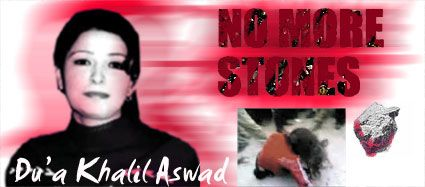
According to a CNN report the policemen who were present at the time of stoning to death of the 17 year old Kurdish girl will not be prosecuted based on the claim that the crowd was too large to do anything. This is despite the fact in the video they did not even seem to make slightest attempt to mediate or stop the stoning.
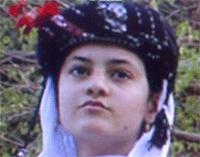 10 men were accused of the crime, 4 of which have been arrested and 6 have fled. The primary person accused of initiating the stoning is the girl’s cousin. Doa was stoned becuase she was in love with Muslim boy while she was from a different Yezidi sect who are not supposed to marry outside their faith. Following the incident, Sunni Muslims have killed 32 Yezidi men in retaliation.
10 men were accused of the crime, 4 of which have been arrested and 6 have fled. The primary person accused of initiating the stoning is the girl’s cousin. Doa was stoned becuase she was in love with Muslim boy while she was from a different Yezidi sect who are not supposed to marry outside their faith. Following the incident, Sunni Muslims have killed 32 Yezidi men in retaliation.
A Kurdish website is dedicated to Doa and other Kurdish victims of “Honour Killing” at : http://dua.kurdistan4all.com/ with articles and links in different languages at : http://dua.kurdistan4all.com/article.htm
Over 5000 women and girls , some under 18, are killed every year by family members in so-called ‘honour killings’, according to the UN. These crimes occur where cultures believe that a woman’s unsanctioned sexual behaviour brings such shame on the family that any female accused or suspected must be murdered. Reasons for these murders can be as trivial as talking to a man, or as innocent as suffering rape. 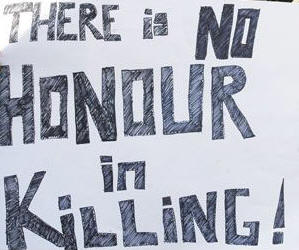
"I was scared"
Video Collage by pdub
15 and 13 year old children executed in India
Two Indian boys, Asif Iqubal, aged 13, and Sahin Sk., aged 15, were allegedly taken into custody by the Indian Police and shot at close range on 1 April 2007.
The two boys Asif Iqbal (13 year-old) and Sahin SK (15 year-old) were allegedly in the process of smuggling two  cows across the border between India and Bangladesh, when the Commandant of the Border Security Force (BSF) belonging to the 140 Battalion posted at Kaharpara border out post saw them and ordered to catch them. Consequently, three or four subalterns caught them and fired them from point blank range, despite the young age of the two boys and the fact that they were unarmed. Two eyewitnesses were reportedly present during the incident.
cows across the border between India and Bangladesh, when the Commandant of the Border Security Force (BSF) belonging to the 140 Battalion posted at Kaharpara border out post saw them and ordered to catch them. Consequently, three or four subalterns caught them and fired them from point blank range, despite the young age of the two boys and the fact that they were unarmed. Two eyewitnesses were reportedly present during the incident.
The bodies of the two boys were allegedly brought and left for hours in front of the Raninagar police station, but no medical examination was undertaken to determine their condition and to confirm their death and the cause of it.
The boys were students of the Katlamari High School. They come from a socially and economically backward community in Murshidabad district and were struggling to find finances for their study. To find some extra income hey were working as a “cowboy” to cover their education cost. In Murshidabad district, there are traders of cattle who illegally trade cattle across the Indo-Bangladesh border. Usually the trade is carried out with the blessings of the local politicians and criminals and the BSF officers stationed in the area. Often this illegal trade is left unreported and the BSF officers, local police, politicians and the traders make money risking the life of poor peasants who owing to extreme poverty in the area agree to take cattle across the border, often at night.The BSF is stationed at the Indo-Bangladesh border to prevent illegal infiltration and also to prevent illegal cross-border trade. However, they allow the illegal trade and also human trafficking across the border, provided they are paid off. But in certain occasions the BSF take into custody some of the merchandise and also the accompanying persons for the records and produce them at the local police station. However in certain occasions they murder the persons captured in case they feared that they would expose the involvement of the BSF in the illegal traffic.It is alleged that Asif and Sahin were hired by one smuggler for passing two cows from Indian side to Bangladesh in exchange of only Rs 200/- (nearly 4.5 USD). It is also alleged that the personnel of 140 Battalion posting at the Kaharpara Border Out Post were bribed Rs 5000/- (nearly 111USD) to ignore such illegal trade.
Indian Border security force also killed a 14 year old in June 2006, 17 year old in May 2006 ,
PHOTOS OF SHOT BOYS (WARNING: GRAPHIC IMAGES): Asif Iqbal (13) - Sahin SK (15)
Stop Child Executions Campaign is gravely concerned about thse executions and remind that India is party to the UN Convention on the Rights of the Child and bound to the obligation therein to “[…] recognise that every child has the inherent right to life […][and to] ensure to the maximum extent possible the survival and development of the child” (article 6). Furthermore, the SCE Campaign reiterate the concern expressed by the Committee on the Rights of the Child in its last Concluding Observations in 2004 as regards to the “numerous reports of alleged instances of killings of children by law enforcement officials” in India (CRC/C/15/Add.228, 26 February 2004, paragraph 42).
Recommended action
Please write to the authorities of India urging them to:
- order an impartial and exhaustive inquiry into the killing of these two children, identify all those responsible, bring them before a competent and impartial tribunal and apply penal, civil and/or administrative sanctions as provided by law;
- ensure that, in case the allegations are proved, adequate compensation would be provided to the families of the victims;
- guarantee the respect of human rights and the fundamental freedoms throughout the country in accordance with national laws and international human rights standards and particularly guarantee the safety and the physical and psychological integrity of all children throughout the country and adopt immediate measures to put an end to extra-judicial killings of children and youths;
-
Provide appropriate protection to the witnesses of these alleged arbitrary executions.
Addresses
– Raninagar Police Station, Tel: +91-3481-238038. Mr. Sunayan Basu, Officer-in-Charge of Raninagar Police Station, Tel: + 91 9732745592
– Justice Rajendra Babu, Chairperson, National Human Rights Commission of India, Faridkot House, Copernicus Marg, New Delhi 110 001, Tel: +91 11 230 74448, Fax: +91 11 2334 0016, Email: chairnhrc@nic.in
– Justice Shyamal Kumar Sen, Chairman, West Bengal Human Rights Commission, Bhabani Bhaban, Alipur, Kolkata – 27. Phone +91-33-24797727, 24791629, Fax – 24799633, Email: wbhrc@cal3.vsnl.net.in
– Shri Manmohan Singh, Prime Minister of India, Prime Minister’s Office, Room number 152, South Block, New Delhi, Fax: + 91 11 2301 6857
– Shri Shivraj Patil, Union Minister of Home Affairs, Ministry of Home Affairs, 104-107 North Block, New Delhi 110 001 India, Fax: +91 11 2309 2979.
– Justice K. G. Balkrishnan, Chief Justice of India, Supreme Court, Tilak Marg, New Delhi -1, Email: supremecourt@nic.in
– H.E. Mr. Swashpawan Singh, Ambassador Extraordinary and Plenipotentiary Permanent Representative to the United Nations (Geneva), Rue du Valais 9 (6ème étage), 1202 Geneva, Tel: +41 22 906 86 86, Fax: +41 22 906 86 96, Email: mission.india@ties.itu.int
Source: Child Rights Information Network (CRIN), Asian Human Rights Commission,
Iran executes another child
Stop Child Executions Campaign regret to inform that yesterday Iran executed another child Sa’id Qanbar Zahi aka Saeed 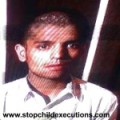 Kamberzai. Saeed was accused of affiliation with a Baluch political group. According to the Baluchistan’s People Party report, Saeed was also severely tortured.
Kamberzai. Saeed was accused of affiliation with a Baluch political group. According to the Baluchistan’s People Party report, Saeed was also severely tortured.
17 years old Saeed was from the Southern province of Baluchestan, Iran. Saeed is the second minor executed within the past month. Stop Child Executions Campaign strongly condemn Saeed’s execution and encourage readers to send a letter, condemning the execution, to Iran’s head of judiciary, Ayatollah Shahrudi who personally approves the child executions:
Head of the Judiciary,
His Excellency Ayatollah Mahmoud Hashemi Shahroudi
Justice Ministry BLDG. – Panzdah-Khordad (ARK) Sq.
Tehran. Iran.
Phone: [00 98 21] 391 1109
Fax: [00 98 21] 390 4986
Email:info@dadgostary-tehran.ir
(In the email subject line write:
URGENT LETTER TO AYATOLLAH HASHEMI SHAHROUDI )
Comment box through his website:
http://iranjudiciary.org/contactus-feedback-fa.html
(The fields are written in Persian. The first line is for your name, 2nd your email, 3rd the subject which should read ‘URGENT LETTER TO AYATOLLAH HASHEMI SHAHROUDI’ and 4th field is for your comments)
Sources: Baluchistan’s People Party, Iranpress News, Etemaad Newspaper
